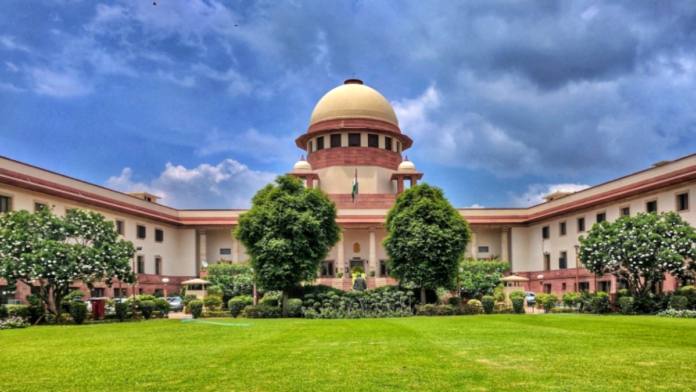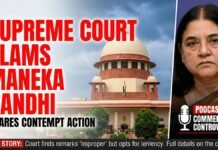
Key Points
- Three-judge bench hears challenges to August 11 order directing blanket removal of strays; decision reserved after detailed arguments.
- Court rebukes civic bodies for failing to implement existing animal control rules; says problem stems from local authorities’ inaction.
- SG Tushar Mehta cites “silent suffering majority,” says children are dying from rabies; over 37 lakh dog-bite cases reported in a year.
- Kapil Sibal, Abhishek Manu Singhvi seek stay; argue shelters don’t exist, ABC Rules and prior SC orders bar mass relocation without infrastructure.
- Case moved from earlier two-judge bench after uproar over August 11 directions mandating rounding up of all strays and prohibiting their release.
New Delhi: A three-judge Supreme Court bench of Justices Vikram Nath, Sandeep Mehta and N.V. Anjaria heard pleas challenging its August 11 directive ordering authorities in Delhi-NCR to remove all stray dogs and relocate them to shelters, and reserved its order on whether to stay those directions pending full adjudication. The bench sharply criticized local authorities, observing that laws and rules exist but are not implemented, and stressed that the “whole problem” is due to the inaction of civic bodies.
How We Got Here
A two-judge bench comprising Justices J.B. Pardiwala and R. Mahadevan on August 11 directed Delhi, NOIDA, Ghaziabad, Gurugram and Faridabad authorities to immediately round up stray dogs, create shelters within eight weeks with CCTV monitoring and personnel, keep detailed records, operate a helpline, capture dogs within four hours of complaints, and strictly prohibit releasing captured dogs back to public places. Following widespread public outcry and concerns about conflicts with earlier Supreme Court orders and ABC (Animal Birth Control) Rules, the Chief Justice reassigned the matter to a larger bench that took it up on August 14.
Key Arguments In Court
- Government/Delhi (SG Tushar Mehta):
- Framed the issue as a clash between a “vocal minority” and a “silent suffering majority,” asserting that children are dying due to rabies from dog bites.
- Claimed sterilization does not stop rabies and called for immediate, court-mandated intervention to separate dogs without advocating killing.
- Cited data indicating over 37 lakh dog-bite incidents in a year nationwide, and pointed to rabies fatalities.
- Petitioners/Animal Welfare Side (Kapil Sibal, Abhishek Manu Singhvi and others):
- Sought a stay on the August 11 order, arguing there are inadequate or no government-run shelters and that the order contradicts existing ABC Rules and prior SC precedents.
- Contended the blanket prohibition on releasing sterilized, vaccinated community dogs is unworkable without shelters and violates scientific management norms.
- Noted that while dog bites are a concern, claims of rabies deaths in Delhi this year were contested by counsel during the hearing.
Bench’s Observations
The bench underscored that Parliament has framed laws and rules but authorities have not implemented them, pinning responsibility on civic bodies and even asking intervenors to “own responsibility” for outcomes. While reserving its order, the court indicated it would consider whether immediate interim directions or a stay on the August 11 verdict are warranted, clarifying that the broader case is not being closed.
What The August 11 Order Required
- Immediate creation of shelters/pounds in Delhi with CCTV monitoring and staff; initial capacity target of 5,000 dogs.
- Start picking up stray dogs from all areas, prioritizing vulnerable localities, and maintain daily capture records.
- Strict prohibition on releasing any captured stray back to streets/public places.
- Helpline for dog-bite cases and capture within 4 hours; sterilization and immunization thereafter; disclosure of vaccine stock.
- Warning of contempt for obstruction by individuals or organizations.
Why It Matters
The outcome may reset how Delhi-NCR tackles public health risks from dog bites and rabies while aligning actions with animal welfare laws, ABC Rules, and previous Supreme Court jurisprudence, amid capacity constraints for shelters and sterilization programs. With the order reserved, authorities and stakeholders await clarity on whether the August 11 directions will be paused or modified pending final adjudication.
















































